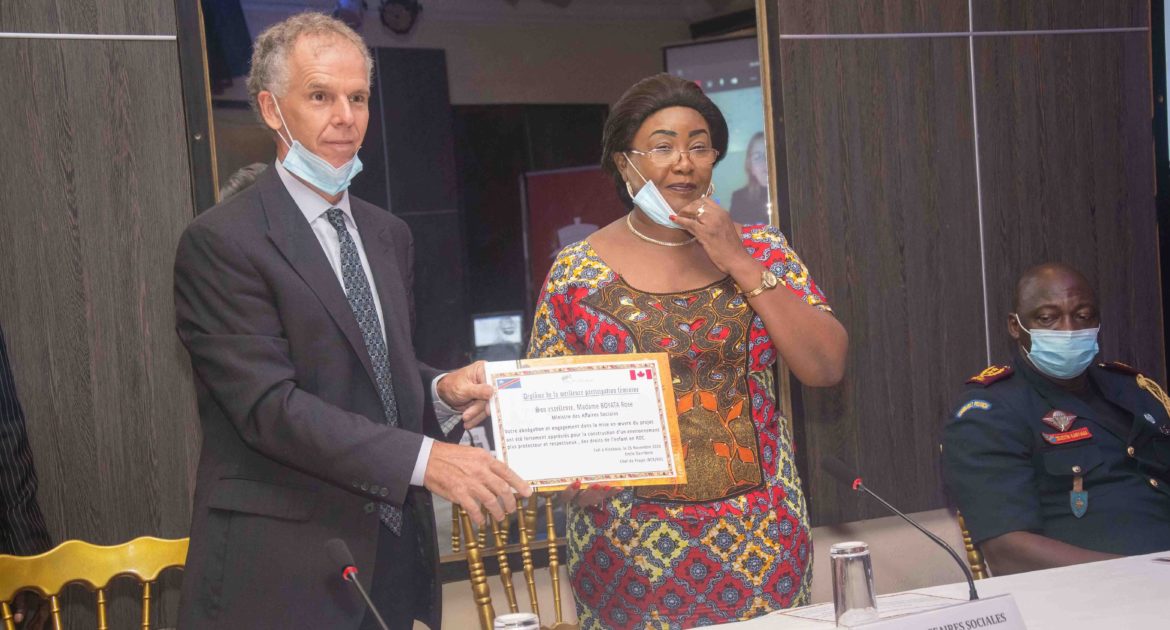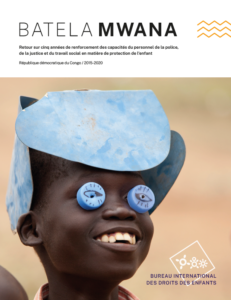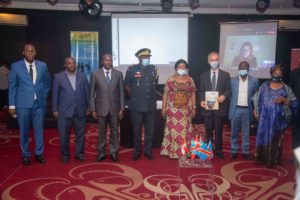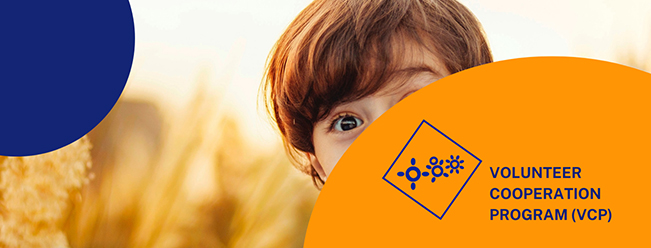
Last November, the IBCR completed a major project in the Democratic Republic of Congo, implemented since 2015 and which aimed to strengthen the professions in the security, justice and social work sectors in the field of child rights and protection. After 5 years of actions carried out in partnership with the Congolese authorities, the results are there, and concrete changes are visible, positively impacting the country’s children.
« Batela Mwana » : five years of capacity building for police, justice and social work personnel in the field of child protection.
In 2015, the International Bureau for Children’s Rights committed itself in the Democratic Republic of Congo (DRC) to support the government in improving the protection of its children, who were then faced with numerous situations of vulnerability and lacked confidence in the institutions and people who were supposed to protect them.
To remedy this situation, the IBCR has launched – in partnership with the country’s institutions – a major project, called Batela Mwana (“protect the child” in Lingala), to build the capacity of staff in some key sectors of child protection: security, justice and social work. This project was intended to enable Congolese children in contact with the justice system to have access to services that are more respectful of their rights, by better training and equipping the professionals who interact with them.
The IBCR thus acted in close collaboration with child protection institutions and organisations in the DRC in order to enable an adapted and sustainable change in favour of the country’s children.
The police, the judiciary and other services involved in this project should have only one goal: to contribute to an efficient service that allows our children to live in peace and to enjoy their rights without constraints or obstacles. That is what development is all about!
John Mugabushaka, Chief of Staff to the Minister of Social Affairs, 2018Convincing results, 5 years later:
- 14 558 professionals, including 1,681 women, have been sensitised, equipped and trained on the rights of the child and good practices in child protection in the DRC.
- 71 420 professionals have indirectly benefited from the IBCR’s actions and are now better equipped to protect children.
- 79 % of targeted professionals report that they are better able to integrate children’s rights in their interventions as a result of project activities.
- 30 to 90 hours of courses on children’s rights have been integrated into the professional training programmes of the police, social sector and justice, on a permanent, compulsory and evaluated basis.
- 178 people, including 41 women, have been trained to deliver the courses created by the project in a sustainable way in the various associated Schools.

Convincing results, 5 years later :
14 558 professionals, including 1,681 women, have been sensitised, equipped and trained on the rights of the child and good practices in child protection in the DRC.
71 420 professionals have indirectly benefited from the IBCR’s actions and are now better equipped to protect children.
79 % of targeted professionals report that they are better able to integrate children’s rights in their interventions as a result of project activities.
30 to 90 hours of courses on children’s rights have been integrated into the professional training programmes of the police, social sector and justice, on a permanent, compulsory and evaluated basis.
178 people, including 41 women, have been trained to deliver the courses created by the project in a sustainable way in the various associated Schools.
The efforts made during these years have enabled professionals in charge of child protection to develop new skills and practices in the field of child protection, a very important step towards the realisation of the rights of Congolese children.
Danielle Gagnon, Head of Canadian Cooperation in the Democratic Republic of Congo (2020)
The actions of the project have led to the following changes:
1- Professional practices are better adapted to children and respect their rights.
The approach to justice for children is evolving; judicial personnel as a whole are increasingly sensitive to children’s rights and show more respect, patience and compassion for the children they receive. Educational measures are favoured, children are better informed and more invited to take part in decisions that affect them.
Listening to children is becoming more widespread within the Police, who now use adapted communication techniques. Confidentiality is better respected and practices are evolving to take into account the gender specificities of children in their accompaniment.
2- Collaboration between sectors is strengthened and the transversal role of social work has been considerably enhanced.
Whereas social workers used to be involved only on an ad hoc basis in accompanying children in contact with the law, they are now found at all stages of their journey, from their arrival in the squadrons to their accompaniment in court, if necessary. This is a major step forward in ensuring that children’s rights are respected during the proceedings, creating a relationship of trust with them, and enabling them to benefit from quality psychosocial assistance. Social services offices have been set up in 7 out of 12 provincial child protection and sexual violence prevention squads.
3- Professionals are better trained and equipped to respect the rights of the child.
The integration of the training kits into schools has enabled current and aspiring professionals in the three sectors concerned by the project to develop a better understanding of children’s rights, adopt child-friendly practices and ensure enhanced protection of children’s rights in line with international standards.
13,535 learners, including at least 1,640 women, have been trained through these courses, a number that will continue to grow year on year as the course is taught, enabling a global and sustainable transformation of practices.
4- By working directly with the Congolese government, the project has promoted the adoption of directives, ministerial orders and institutional measures consolidating the rights recognised for children, particularly girls.
The rights of more than 290,000 children are thus better protected and respected in the DRC.

Closing event, 2020
The closing workshop does not mark the end of the Batela Mwana project but it does mark the withdrawal of IBCR and the effective transition to the Congolese state. The tireless work we have done together to date culminates in giving you the tools necessary to sustainably strengthen the Congolese child protection system and the realization of children’s rights.
Cathy Launay-Alcala, Director of Operations and Programmes, 2020For more details on the Batela Mwana project and its achievements, you can consult the end-of-project brochure: Batele Mwana, A look back at five years of capacity building for police, justice and social work personnel in child protection.
This project would not have been possible without our partners, to whom we extend our sincere gratitude:
- Global Affairs Canada, for its financial support
![]()
- All our partners in the DRC, and particularly the institutions and ministries involved, for their constant participation in the project’s actions, allowing the valorisation and sustainability of the actions carried out. Their appropriation of the project and its messages is without a doubt one of the guarantees of its success.
What’s next?
The International Bureau for Children’s Rights does not rule out continuing its action and supporting the Congolese government once again in strengthening its child protection system in the future. Several projects are currently under discussion with Canadian and Congolese authorities and could be implemented in the coming years.
Stay informed, join our community by subscribing to our newsletter!
More about the project and its results





